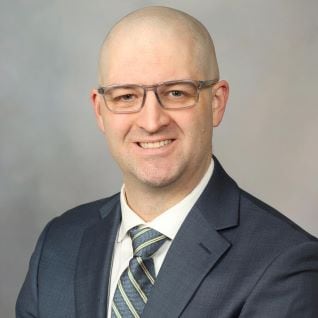Department and Faculty
The cardiovascular and thoracic (CVT) anesthesia surgical practice encompasses a broad variety of case types. In addition to coronary revascularization and valve repair or replacement, Mayo Clinic surgeons routinely perform a full spectrum of CVT operations, including aortic reconstruction, tumor resection, myectomy, and treatment of a variety of congenital diseases in both adult and pediatric patients.
Furthermore, Mayo Clinic has a large and growing practice related to ventricular assist device placement and CVT transplantation. Several Mayo surgeons regularly perform robotic-assisted and minimally invasive cardiac surgery. A rapidly growing interventional cardiac surgery and cardiology practice offers you exposure to percutaneous valve procedures, device implants and electrophysiology ablation procedures.
While the cardiothoracic practice is busy, sufficient staffing allows you to maintain an appropriate work-life balance.
From the program director
 Thank you for your interest in the Adult Cardiothoracic Anesthesiology Fellowship at the Mayo Clinic in Rochester, Minnesota. Pursuit of fellowship training in cardiothoracic anesthesia is challenging yet a very professionally satisfying career decision. The level of confidence and competence that trainees attain during this fellowship year allows for a successful and rewarding career in either academic or private practice anesthesiology. Our program provides trainees exposure to a wide variety of cardiothoracic cases in a high volume surgical practice. Given that we elect to only take three fellows annually, the experience our trainees get is unmatched.
Thank you for your interest in the Adult Cardiothoracic Anesthesiology Fellowship at the Mayo Clinic in Rochester, Minnesota. Pursuit of fellowship training in cardiothoracic anesthesia is challenging yet a very professionally satisfying career decision. The level of confidence and competence that trainees attain during this fellowship year allows for a successful and rewarding career in either academic or private practice anesthesiology. Our program provides trainees exposure to a wide variety of cardiothoracic cases in a high volume surgical practice. Given that we elect to only take three fellows annually, the experience our trainees get is unmatched.
Fellows work extensively one-on-one with core faculty members, which allows for both academic and professional mentorship. While the demands of a one-year fellowship in adult cardiothoracic anesthesiology focus on attaining clinical proficiency in a complicated specialty, the work-life balance and well-being of our fellows is an emphasis. Additionally, opportunities to be involved with research and quality improvement initiatives are plentiful for trainees who desire this experience.
I want to thank you again for taking the time to check out our fellowship program.
Allan Klompas, M.B., B.Ch., B.A.O.
Adult Cardiothoracic Anesthesiology Fellowship Program Director
Faculty
In addition to caring for patients in clinical practices, Mayo Clinic's faculty is committed to teaching and facilitating the growth of medical knowledge. Many of our faculty members have published and lectured extensively and are highly regarded in their fields. You have direct access to the anesthesiology and perioperative medicine faculty at Mayo Clinic throughout your training in the Adult Cardiothoracic Anesthesiology Fellowship.
Facilities
Mayo Clinic uses a perioperative information management system. In the Division of Cardiovascular and Thoracic Anesthesia, the anesthesia record is electronic. Patient data, management protocols, procedure descriptions, and topic discussions are immediately available online. The intraoperative workstation in each operating room is intranet and internet connected.
These workstations can be used to access library resources intraoperatively, and they are an extraordinary resource as a database. Experience using this model of perioperative information management will benefit you throughout your career.
Advisers and mentors
You are assigned a dedicated faculty adviser who can provide comprehensive educational advice and personal support. Trainees meet with their advisers periodically throughout the program to review their progress and career goals, and ensure that their educational needs are being met. Your adviser also serves as a contact point for introducing you and your family to Rochester, Minnesota, and the Mayo Clinic system.
Visiting professors
Many prominent professors visit Mayo Clinic each year. They present their work during lectures, participate in hospital rounds, and have informal discussions with trainees. You are encouraged to take full advantage of these educational opportunities.